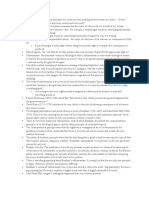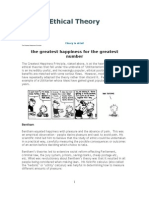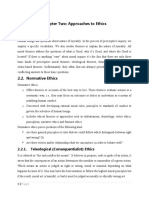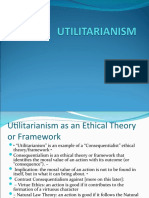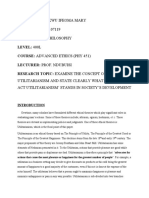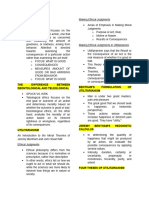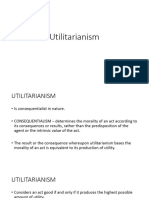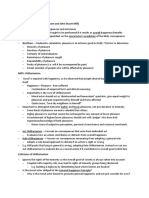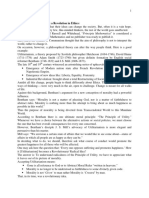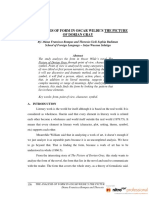0% found this document useful (0 votes)
45 views11 pagesPhilosophy & Utilitarianism Guide
The document discusses several key concepts in utilitarian ethics:
1. Hedonism prioritizes individual happiness over harm caused to others. Consequentialism judges actions solely by their consequences. Maximalism produces the greatest good and least bad consequences. Universalism considers consequences for all equally affected parties.
2. Act utilitarianism judges actions based only on immediate consequences, while rule utilitarianism also considers long-term effects and likelihood of producing good outcomes.
3. Jeremy Bentham believed humanity is governed by pleasure and pain as "twin masters" and should prefer pleasure over pain. He developed a hedonic calculus to maximize happiness and minimize pain when assessing actions.
4. Raw
Uploaded by
Tharshinie MenonCopyright
© © All Rights Reserved
We take content rights seriously. If you suspect this is your content, claim it here.
Available Formats
Download as DOCX, PDF, TXT or read online on Scribd
0% found this document useful (0 votes)
45 views11 pagesPhilosophy & Utilitarianism Guide
The document discusses several key concepts in utilitarian ethics:
1. Hedonism prioritizes individual happiness over harm caused to others. Consequentialism judges actions solely by their consequences. Maximalism produces the greatest good and least bad consequences. Universalism considers consequences for all equally affected parties.
2. Act utilitarianism judges actions based only on immediate consequences, while rule utilitarianism also considers long-term effects and likelihood of producing good outcomes.
3. Jeremy Bentham believed humanity is governed by pleasure and pain as "twin masters" and should prefer pleasure over pain. He developed a hedonic calculus to maximize happiness and minimize pain when assessing actions.
4. Raw
Uploaded by
Tharshinie MenonCopyright
© © All Rights Reserved
We take content rights seriously. If you suspect this is your content, claim it here.
Available Formats
Download as DOCX, PDF, TXT or read online on Scribd
/ 11









